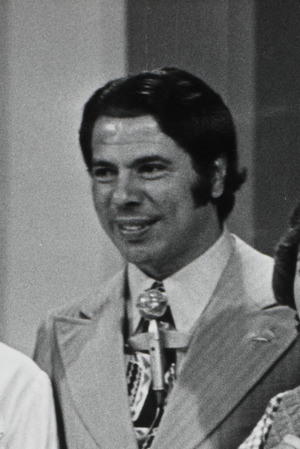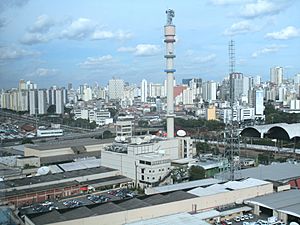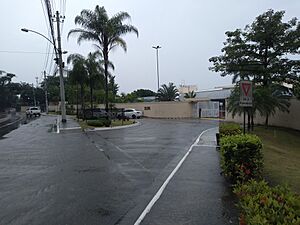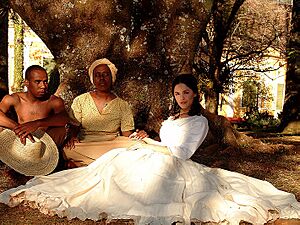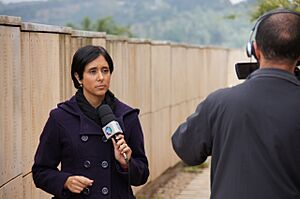RecordTV facts for kids
 |
|
| Type | Free-to-air Commercial broadcasting Television network |
|---|---|
| Country | Brazil |
| Stations | RecordTV Belém RecordTV Brasília RecordTV Cabrália RecordTV Goiás RecordTV Interior RJ RecordTV Interior SP RecordTV Itapoan RecordTV Litoral e Vale RecordTV Manaus RecordTV Minas RecordTV Paulista RecordTV Rio RecordTV Rio Preto RecordTV RS RecordTV São Paulo |
| Affiliates | see List of RecordTV affiliates |
| Headquarters | São Paulo, Brazil |
| Programming | |
| Language(s) | Portuguese |
| Picture format | 1080i HDTV (downscaled to 480i for the SD feed) |
| Ownership | |
| Parent | Grupo Record |
| Key people | Edir Macedo (chairman), Luiz Cláudio Costa (president) |
| Sister channels | RecordTV Internacional Record News |
| History | |
| Launched | 27 September 1953 |
| Founder | Paulo Machado de Carvalho |
| Former names | Rede Record (1990-2016) |
| Availability | |
| Terrestrial | |
| Analog VHF | 07 VHF (Itabuna) |
| Digital terrestrial television |
|
RecordTV, also known as Rede Record, is a big free-to-air (meaning you don't pay to watch it) TV network in Brazil. It's currently the second largest commercial TV station in the country. In 2021, it was the second most-watched channel in Brazil, right after TV Globo.
RecordTV is a main part of the media company Grupo Record. Its main office is in São Paulo, Brazil. Most of its shows are made there. They also have a branch in Rio de Janeiro where they produce their popular soap operas (telenovelas). RecordTV reaches almost all of Brazil through 111 stations. Fifteen of these stations are owned by the company, and 96 are partner stations.
The TV station first started in São Paulo on September 27, 1953. It was founded by a businessman named Paulo Machado de Carvalho. He already owned many radio stations. RecordTV was one of the first TV stations to open in Brazil.
In the 1960s, RecordTV became very popular. It even had the most viewers, thanks to music festivals like MPB and Jovem Guarda. Later, in the 1970s, TV host Silvio Santos bought half of the channel. In 1989, RecordTV was sold to Bishop Edir Macedo, who is the leader of the Universal Church of the Kingdom of God.
After this sale, the station received big investments. In the 1990s, it grew into a national network. From 2007 to 2015, it was the second largest network in Brazil.
Contents
History of RecordTV
How RecordTV Started
Television came to Brazil in 1950. Just two months later, businessman Paulo Machado de Carvalho got permission to start a new TV channel. This was on November 22, 1950, for channel 7 in São Paulo. Paulo's family already owned many radio stations. They decided to name the new TV station TV Record, using the name of their popular radio station, Rádio Record.
To get the station ready, they brought modern equipment from the United States. This equipment was set up in their studios in the Moema neighborhood of São Paulo. Before officially starting, the channel did some test broadcasts. They showed a choir and an orchestra to make sure everything worked.
Launching the Channel
The channel officially started broadcasting on September 27, 1953, at 8:53 PM. The first image shown was of two artists, Blota Júnior and Sônia Ribeiro. They announced the launch of RecordTV. After a speech, a big show began with famous musicians and dancers.
In its early days, RecordTV showed many different types of programs. These included music shows with international stars like Nat King Cole, sports, theater, comedy, and news. In 1954, they aired Capitão 7, the first TV series made in Brazil. It was on air until 1966. Other popular shows included Mesa Redonda and Grande Gincana Kibon.
Growing in the 1960s
Early Expansion of the Network
As RecordTV grew, Paulo Machado de Carvalho teamed up with his brother-in-law, João Batista do Amaral. They created a partnership between TV Record in São Paulo and TV Rio in Rio de Janeiro. This new group was called Rede Unidas de Televisão. They built a special link between Rio and São Paulo. This link allowed them to share shows and broadcast events together. For example, TV Record broadcast the Brazilian Turf Grand Prix live from Rio. This partnership helped Emissoras Unidas gain more partner stations across Brazil.
New Shows and Firsts in Brazilian TV
In 1958, RecordTV and TV Rio launched their first regular shared program, Show 713. This show split the screen in half, with each city showing its own content. It featured interviews, news, and music. RecordTV also opened its Teatro Record in São Paulo. This theater was used for musical performances and recording shows.
In the 1960s, RecordTV was the only TV station outside of Brasília to broadcast the opening of the new capital city. They interviewed many Brazilian politicians, including the president at the time, Juscelino Kubitschek.
Challenges and Popular Programs
RecordTV's main office in Moema had a fire in May 1960. This caused them to air more shows from TV Rio while they recovered. This was one of several fires the channel faced. The most serious one was in July 1966, where many old tapes were lost. Despite these problems, RecordTV became very popular in the 1960s. They showed many great programs, especially music shows like O Fino da Bossa and the famous MPB Festivals. Many well-known artists like Gilberto Gil and Elis Regina performed during these festivals.
Facing More Competition
As TV Globo grew and TV Tupi became stronger, RecordTV's audience slowly started to shrink. However, the station still managed to create some popular shows. These included Família Trapo with Ronald Golias and Jô Soares, and the news program Repórter Esso. Another fire at the Teatro Record forced the station to move its São Paulo office to Augusta Street.
RecordTV in the 1970s and 1980s
New Partnerships and Changes
In 1967, the partnership between TV Rio and RecordTV ended due to disagreements. But later, the two stations reconnected and formed the Rede de Emissoras Independentes (REI). Soon after, businessman and TV host Silvio Santos bought half of RecordTV. He used this to show some of his programs. The original owners of RecordTV eventually agreed to let Silvio Santos help run the station.
By this time, RecordTV had lost many viewers to TV Tupi, Rede Globo, and the new Rede Bandeirantes. TV Rio then left the Emissoras Independentes, leaving RecordTV as the only channel in REI. REI later broadcast the 1970 FIFA World Cup live from Mexico. The channel also brought in famous entertainers like Chacrinha.
Due to its declining popularity, RecordTV sold its theater in Rua Augusta. Meanwhile, Silvio Santos started a new TV channel in Rio de Janeiro called TVS. He began sharing shows between TVS and RecordTV. In 1978, Paulo Machado de Carvalho got permission for RecordTV to operate two more channels in other parts of the state. This helped RecordTV become a statewide network. Two years later, when TV Tupi closed, Programa Silvio Santos moved to RecordTV.
The Rise of SBT and RecordTV's Struggles
Silvio Santos received permission from the government to start his own TV network, SBT, in 1981. He used some of the old Rede Tupi stations and studios. Silvio Santos and Paulo Machado then started managing channel 9 in Rio de Janeiro. This became TV Record Rio de Janeiro in 1982. It was RecordTV's fourth station. Both stations belonged to the Rede de Emissoras Independentes, which had very few viewers at the time. This was the channel's next attempt to become a national network.
After SBT was founded in 1981, TV Record São Paulo became less important to Silvio Santos. But the Machado de Carvalho family, who co-owned the channel, wanted to keep investing in it. In 1983, the show Especial Sertanejo started, promoting Brazilian country music. News remained important with Jornal da Noite, which was two hours long and broadcast nationwide. In 1985, SBT became a national network. In 1986, RecordTV broadcast its second World Cup. In 1987, Programa Silvio Santos stopped being shown on RecordTV. Silvio Santos also reduced his financial support for TV Record São Paulo. This led the Machados to give up Channel 9, which later became TV Copacabana.
The End of an Era
In 1989, the Rede de Emissoras Independentes, still led by TV Record de São Paulo, faced a big crisis and closed down. RecordTV became a local station again, with only the São Paulo station and two others in the countryside. Channel 9 in Rio de Janeiro became TV Corcovado.
RecordTV is Sold
RecordTV was in a very bad financial situation and almost went bankrupt. Silvio Santos convinced Paulo Machado de Carvalho to sell the station. At that time, the channel had very low viewership and many debts.
The leader of the UCKG, Edir Macedo, became interested in buying RecordTV. He was in the United States when he heard about the sale. Macedo sent a pastor, Laprovita Vieira, to help with the purchase. The negotiation was quick. Edir Macedo also bought Rádio Record, which was also in bad shape.
A meeting was held with lawyers from both sides, including Edir Macedo, Silvio Santos, and Paulo Machado de Carvalho. The price was agreed upon. Days later, Silvio Santos regretted the sale, but he knew RecordTV was in a difficult situation. Creditors were even threatening to declare bankruptcy for the channel.
After the sale, some people thought RecordTV would only show religious programs. However, this did not happen. The station still shows some religious programs, especially in the early morning. But the new directors, along with Macedo, decided to continue the station's commercial activities.
This deal led to the creation of Central Record de Comunicação in 1989. This became a major media group controlled by Edir Macedo. Today, it includes RecordTV, Rádio Record, the website R7, and Record News.
RecordTV's Growth and Investments (1990-2007)
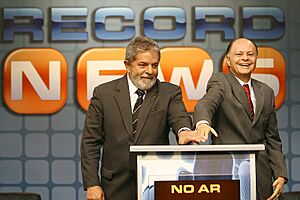
Big Changes and Expansion
After being sold, RecordTV went through major changes. In July 1990, they introduced a new look and changed their programs. This helped them get back viewers they had lost. The station started to expand across the country. It began broadcasting its signal through the BrasilSat A2 satellite. This allowed people with satellite dishes to watch its shows. The channel became Rede Record and started buying its own stations and partnering with others. In 1992, RecordTV finally started broadcasting to Rio de Janeiro again.
In 1995, the station moved to its current main office in Barra Funda. They bought the CBI Studios, which were very modern. During this time, the company hired many famous artists like Eliana and Raul Gil. RecordTV was able to reach third place in national viewership, passing other networks.
New Slogan and More Growth
In 2004, the network decided to start a new phase to get even more viewers. With the slogan On the way to leadership, RecordTV began to create more popular shows. They produced new soap operas that became very successful. Some of these hits included A Escrava Isaura, Prova de Amor, Vidas Opostas, and Caminhos do Coração.
On September 27, 2007, Record News was launched. This was the first free-to-air news channel on Brazilian television. Important people like the governor of São Paulo, José Serra, and the president of Brazil, Luiz Inácio Lula da Silva, attended the opening. The launch was shown on Rede Record's news program, Jornal da Record.
Competing with Other Big Networks
In 2007, Rede Record managed to pass SBT and become the second largest Brazilian TV station. It was only behind Rede Globo. For some programs, RecordTV even managed to get more viewers than Globo. For example, in some cities, its news magazine, Domingo Espectacular, had more viewers than Rede Globo's Fantástico. Also, RecordTV's morning news show, Fala Brasil, sometimes beat Bom Dia Brasil in São Paulo. On December 11, 2009, RecordTV even reached first place in Rio during the broadcast of the movie The Elite Squad.
RecordTV's Redesign (2010-2015)
Helicopter Incident
In early 2010, a RecordTV helicopter crashed in São Paulo. It was covering a robbery when it had a problem. The pilot, Rafael Delgado Sobrinho, died. The cameraman, Alexandre Silva de Moura, was seriously injured and taken to the hospital. RecordTV expressed sadness about the incident. They ended that night's Jornal da Record quietly, honoring their colleagues.
Olympic Games Broadcasts
In 2012, RecordTV was the only channel in Brazil to broadcast the 2012 Olympic Games in London. They also broadcast the 2010 Winter Olympics in Vancouver. This was the first time that their rival, Rede Globo, was not part of the Olympics broadcast. However, in 2016, RecordTV, Rede Globo, and Rede Bandeirantes all broadcast the Summer Olympics together.
Changes and Losing Viewership
In 2013, RecordTV made some big changes. The head of the broadcaster, Alexandre Raposo, was replaced by Luiz Cláudio Costa. Another important change was Marcelo Silva taking over as vice president. After not making much profit in 2012, the company hired experts to help improve its business strategies.
In 2014, SBT, which used to be in second place until 2007, managed to take back its spot. This pushed Rede Record down to third place for the first time since 2007. However, Rede Record still remained one of the top three TV networks in Brazil.
RecordTV Today (2016-Present)
To show its new direction, Rede Record changed its look and name on November 24, 2016. During Jornal da Record, they showed a report about the change. The station's new slogan became "Reinventing is our brand." The name also changed to RecordTV. This change was to show that RecordTV is a modern and multiplatform station. It aims to be a leader in future television and reach more than 150 countries. RecordTV also sells its shows, like soap operas and miniseries, to countries all over the world.
On October 8, 2022, RecordTV faced a ransomware attack. This affected many of the broadcaster's computer systems. It caused problems with their programming. For example, their Saturday morning show Fala Brasil was replaced by reruns of Everybody Hates Chris until things were fixed. Other channels, SBT and TV Cultura, also had similar attacks on the same day.
Telenovelas and Series
Popular Telenovelas
The first soap opera (telenovela) made by RecordTV was A Muralha in 1954. Between 1954 and 1977, the channel produced 78 telenovelas. Some famous ones from this early period were Os Deuses Estão Mortos and As Pupilas do Senhor Reitor. The latter is said to be the most-watched soap opera in RecordTV's history. The last show from this first phase was Meu Adorável Mendigo in 1974. After this, the team that made these shows was closed down. In 1977, however, the network aired O Espantalho, made in partnership with Ivani Ribeiro. Between 1999 and 2004, eight more telenovelas were made through partnerships with other companies.
On May 10, 2004, Herval Rossano was hired to lead the production of telenovelas. He started to guide the network in making big changes. They invested in new, modern equipment, new studios, and hired many new writers and actors. The director suggested seven different stories before choosing which one would restart the drama productions. Besides the first new telenovela, A Escrava Isaura, many other shows became very popular. These included Vidas Opostas, Prova de Amor, Amor e Intrigas, Chamas da Vida, and Caminhos do Coração.
In 2015, the show Os Dez Mandamentos was produced. This was the first biblical telenovela made by the network and in Brazil. Os Dez Mandamentos was a huge success and made history in Brazilian television. With this show, the network broke a viewership record. It surpassed Globo's main soap opera for the first time in 40 years. Because of the show's success, RecordTV decided in October 2015 that the 8:30 PM time slot would only show biblical productions. This soap opera was also shown in many other countries, like Argentina.
On January 19, 2021, with the launch of the soap opera Gênesis, RecordTV managed to beat its competitor in two major cities. This made it one of the most-watched productions in the world.
Miniseries and Other Series
RecordTV has aired more than 20 series and miniseries since the 1950s. Since the drama production team restarted in October 2004, they have made many series and miniseries. Most of these have a biblical or police theme.
Programs
Coverage
RecordTV currently has 15 stations that it owns and operates. It also has 96 partner stations, making a total of 111 stations. It was one of the first channels to use digital television in Brazil.
International Coverage
Record Internacional was created in 2002. It broadcasts to 150 countries and shows programs that are popular in Brazil. Record Internacional has six channels that send a digital signal around the world, and 17 stations. The station is also a partner of CNN International.
In Africa, RecordTV broadcasts to countries like Mozambique, Uganda, Cape Verde, Guinea-Bissau, and Madagascar. In Mozambique, TV Miramar, which is part of Record International, has 10 stations and many local shows that are very successful. The station also broadcasts to all of Asia using two satellites: Asiasat 2 and JSAT.
In the United States, the coverage is provided by the NSS-806 and EchoStar satellites. It is available through Comcast and the Dish Network. In Europe, RecordTV is the only Brazilian TV channel that you can watch without paying any subscription fees. It reaches all countries on the continent.
Awards
ExxonMobil Journalism Award
- 2005: Esso Special for Telejournalism, given to Leandro Cipoloni, Antonio Chastinet, Steve Ribeiro, Luiz Mendes and Paulo Nicolau, for the report "Imbroglione - The Phantom Citizen".
- 2008: Esso Special of Telejournalism, given to André Felipe Tal, Ricardo Andreoni, Jorge Valente and Marcelo Zanini, for the report "Dossiê Roraíma: Pedofilia no Poder".
- 2020: King of Spain Award, given for the third time to the broadcaster, this time for the report "A Besta", from Câmera Record.
See also
 In Spanish: RecordTV para niños
In Spanish: RecordTV para niños




